In the latest of this series of interviews by Iain Martin, presenter of The Ski Podcast, he spoke with BBC Ski Sunday presenter Chemmy Alcott. Alcott is a four-time Winter Olympian who also competed at seven Alpine World Championships. She twice finished 11th at the Olympics, despite a series of injuries, before moving into broadcasting after retiring from racing.
Hi Chemmy, I do want to ask about your racing career and get behind the scenes of Ski Sunday, but what really stands out to me is that two-year period from December 2010 to December 2012 when you dealt with a career-threatening injury.
Winter 2010, I was in the form of my life, ready to compete at the World Cup Downhill in Lake Louise. It’s a venue where I’d had great results, but I made a small mistake in my last training run the night before. I jumped so far without control, slap-landed on the flat, and suffered a double fracture of my right leg. It was a compound tib/fib fracture. When I crashed, the bones broke through the plastic of my ski boot. When you have a really bad injury in ski racing, they don’t put you in a helicopter bed because that can make it worse. So, you know it’s serious when you’re hanging underneath on a long rope like I was. All I could see was the bottom of the helicopter!
Shortly after that, you discovered your funding had been withdrawn by UK Sport?
That was probably my worst day ever. I’m quite a positive person, but I’d flown back after surgery in Canada, and BBC Sport came over to interview me. After a couple of hours, my painkillers were wearing off, and then they said: “Also, just to let you know, UK Sport withdrew your funding this morning. How do you feel about that?” I started crying.
It was during that period, after the Lake Louise accident, that you joined Dancing on Ice—tell us a bit about that.
It was a double whammy. The physio is incredible on Dancing on Ice, and I realised I could get free physio twice a day! The appearance money for the show wasn’t huge, but it’s really good if you make the tour. So, I went in with that athletic mindset that if I came in the top six, I’d make the tour and could afford to ski again. [Chemmy finished 5th.]
You came back from injury to compete at the Sochi 2014 Winter Olympics after another broken leg. How many broken bones have you had?
It’s definitely more than 40. I think it’s 48 or 49. It started when I was 11 and broke my neck at the British School Girls races in Flaine. I’ve broken my collarbone, cracked my humerus at Sandown Ski Centre, and broken lots of ribs and my ankles a few times.
And your first ski experiences were in Flaine?
My parents fell in love with Flaine because it was so easy to reach from the airport, and it’s ski-in/ski-out. I take my kids there now. It’s so easy to get onto the snow. If you have to wait for a bus and your four-year-old is wearing those horrible plastic boots for the first time, they’ll quickly lose interest. You need to get them on the snow quickly.
You spent a lot of your summers in New Zealand as a child. Is it true you arranged your first trip there when you were 10?
Yes, I was at Sandown and saw a notice: “Do you want to spend your whole summer skiing in the Southern Hemisphere?” I thought, “Yes, I definitely do!” I took the number home, climbed onto the kitchen counter, called the number, and spoke to a guy in Scotland. After a long conversation, he asked if I was keen. I said, “Yes, but there’s one thing you need to know. The camp is for teenagers, and I’m only 10!” He sensed my ambition and suggested I talk to my parents. At dinner that night, I told them: “I’ve found this ski race camp in New Zealand, and I want to go.” My mum hesitated, saying, “We’d have to relocate for the summer.” I replied: “No, I’ll go alone!” Now, as a mum of a seven-year-old, I can’t imagine him saying that to me in three years!
You did well at the European Youth Olympics and went to the Salt Lake Winter Olympics in 2002 at only 19. How did you feel competing on such a global stage?
I just remember being petrified. The downhill had loads of jumps, and the security was intense—it was right after 9/11. That Olympics was an incredible starting point for me.
Your second Olympics were in Turin 2006, and the downhill there was one of your best performances…
The odds were stacked against us racing that day. The weather was bad, and the light was super flat. My coach pulled me aside and said: “You’ve got a choice: be scared or be fast.” That was the only coaching advice he gave me, and I had an incredible run, finishing 11th.
You picked up another 11th at the Vancouver Olympics in 2010. Were you gutted to miss the top 10 again?
Coming 11th twice is brutal, knowing how close I was. But Whistler was a tough Olympics. Our funding was cut, and our federation went bankrupt. Under the circumstances, I’ll take that 11th place.
Sochi in 2014 was your fourth Winter Olympics, despite re-breaking your leg the previous summer. What made you decide to compete?
I only returned to skiing in December and was so nervous. Everyone told me not to go, but I’m stubborn and wanted one last go. I qualified with a good result in Cortina, where I celebrated more than Lindsay Vonn, who won the race!
After retiring, you segued into presenting. In 2020, Graham Bell did Dancing on Ice, limiting his Ski Sunday availability…
That winter, Covid-19 took hold. We were the only BBC team working abroad. Ed (Leigh), our cameraman, and I were a team of three, not allowed to see anyone indoors for eight weeks except in the gondola.
Since retiring, you’ve become a parent and are vocal about mums getting back onto the slopes—why is that?
It’s vital for self-esteem. Many mums spend so much time preparing for the holiday they don’t get on the slopes themselves. You need time to follow your passions—it makes you a better parent.
————
Listen to Iain’s full interview with Chemmy Alcott here:

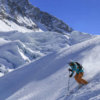
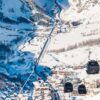
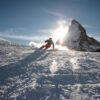
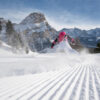
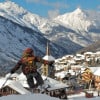
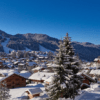
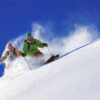
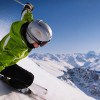
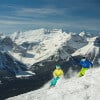
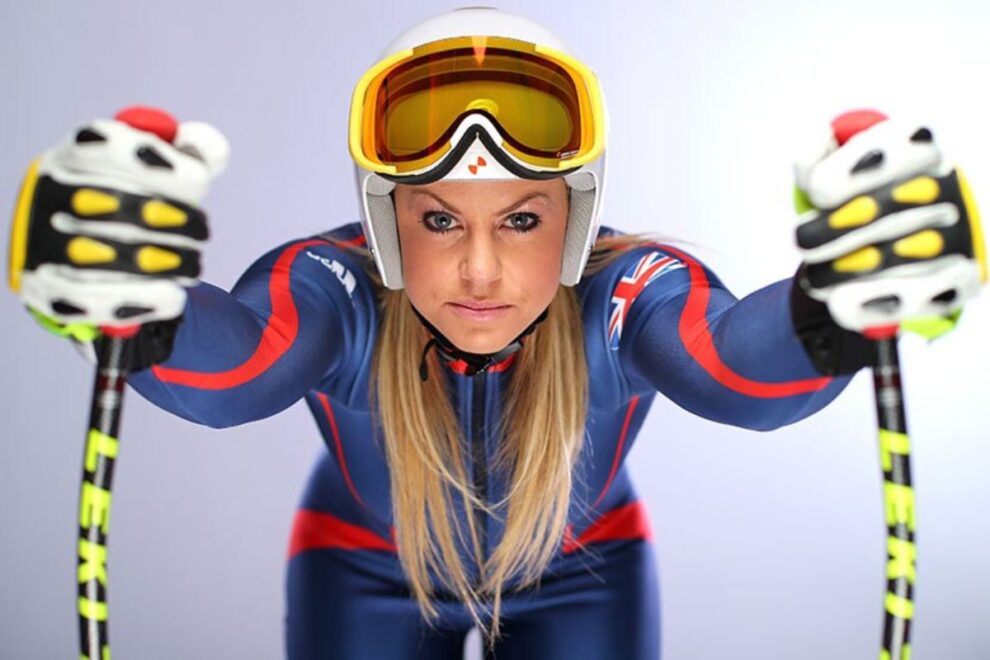
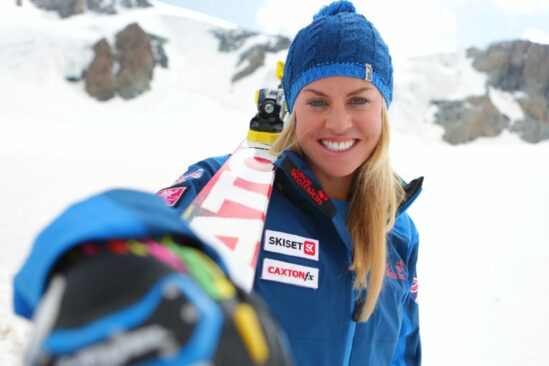
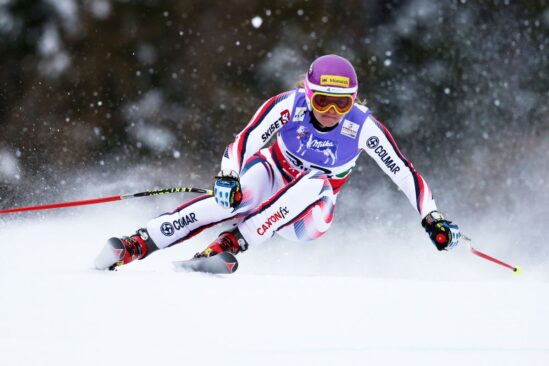
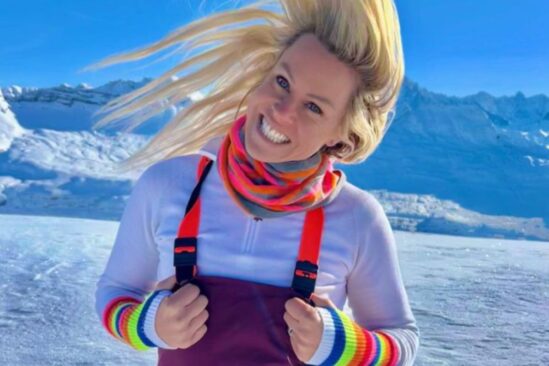
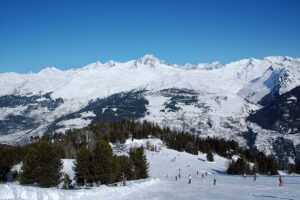

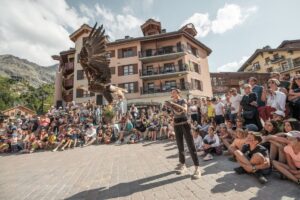
[…] You can read this article here. […]